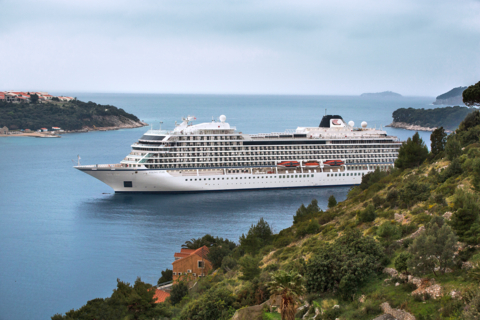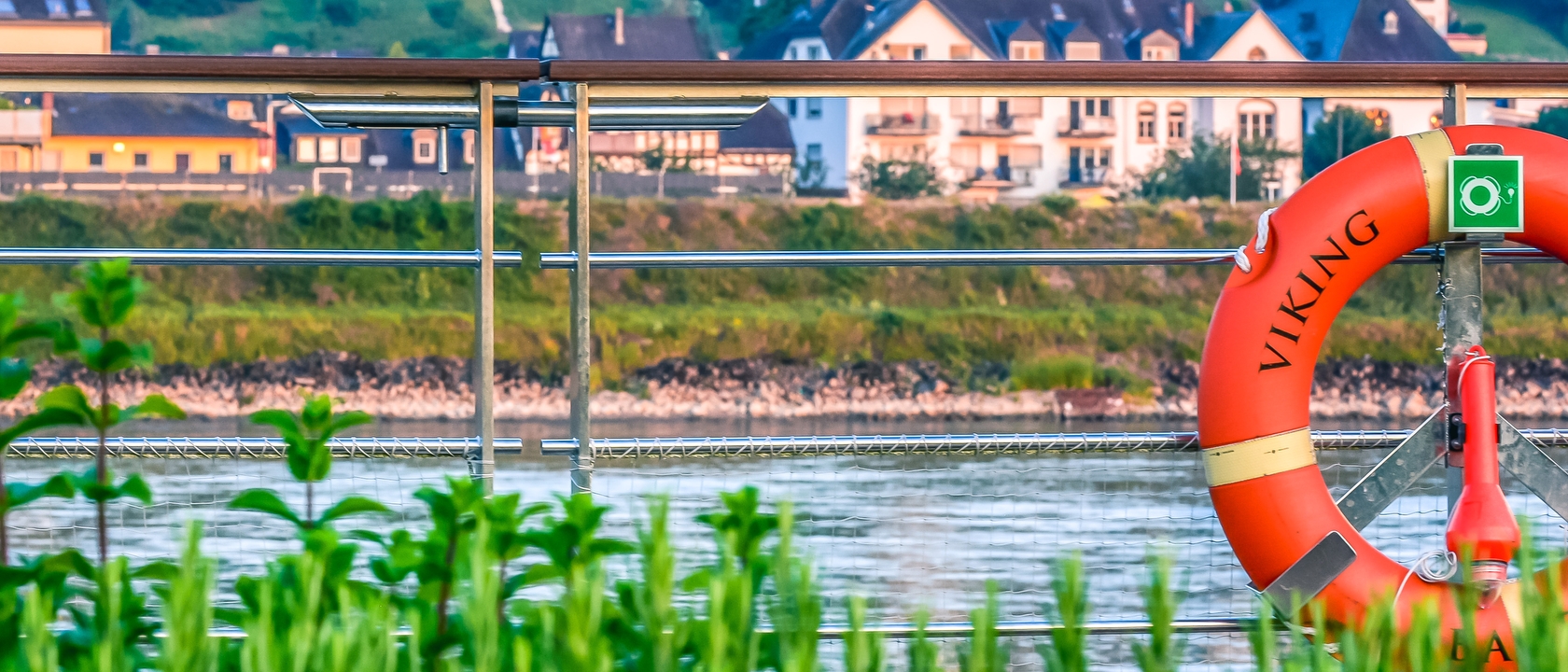Now Open for Reserving, Every New Ocean Voyage Combines Two or Extra In style Itineraries for Extra In-Depth Exploration Throughout Europe
Viking® (www.viking.com) (NYSE: VIK) at the moment introduced that 14 new ocean itineraries exploring the Mediterranean, United Kingdom, Eire and Scandinavia in 2026 and 2027 at the moment are open for reserving. Starting from 15 to 36 days, every of the brand new voyages combines two or extra of Viking’s hottest itineraries to permit for extra in-depth exploration.

Viking at the moment introduced 14 new ocean itineraries exploring the Mediterranean, United Kingdom, Eire and Scandinavia in 2026 and 2027. Now open for reserving, every new ocean voyage combines two or extra of Viking’s hottest itineraries to permit for extra in-depth exploration. Pictured right here, one among Viking’s award-winning ocean ships in Dubrovnik. For extra data, go to www.viking.com.

“Viking friends are curious vacationers who’re taken with enriching their lives by exploring and studying concerning the world,” mentioned Torstein Hagen, Chairman and CEO of Viking. “With our destination-focused strategy and stylish small ships, our voyages have all the time been designed to convey friends nearer to their vacation spot and supply alternatives for cultural immersion. These new voyages supply much more selections for friends who want to lengthen their time overseas with one seamless itinerary.”

With a fleet of small sister ships, Viking provides greater than 100 itineraries throughout all 5 oceans. Viking’s new ocean voyages go to celebrated cultural capitals—in addition to rising locations—all through Europe and past and embody the next:
- NEW for 2026 and 2027 Jewels of the Mediterranean: (15 days; Rome roundtrip) – Discover the famed landmarks of Italy, Tunisia, Spain and France as you embark on a voyage by the Mediterranean Sea. See Palermo’s UNESCO World Heritage Websites in Sicily, hint the beautiful Amalfi Coast and immerse your self in Sardinian tradition. Sail to Tunisia’s vibrant La Goulette, name at historic Valencia, go to glamorous Monte Carlo and stroll the streets of colourful Sète. Overnights in Barcelona and Florence mean you can discover extra.
- NEW for 2026 and 2027 Gems of the Mediterranean: (15 days; Barcelona roundtrip) – Expertise the very best of Spain, Italy and France throughout an unimaginable 15-day journey. See Valencia’s beautiful structure and the historic websites of La Goulette. Hint the spectacular shores of Sardinia and the long-lasting Amalfi coast. Take within the treasured ruins of Rome and stroll the romantic streets of Florence and Pisa. Uncover elegant Monte Carlo, picturesque Marseille and wander the colourful, canal-lined walkways of lesser-known Sète.
- NEW for 2026 and 2027 Spain, Portugal & the Mediterranean: (15 days; between Lisbon – Rome) – Circumnavigate the Iberian Peninsula, calling at Lisbon and Andalusian gems. Go to Barcelona and its cherished sights, together with the Sagrada Familía, the unfinished masterpiece of Antoni Gaudí. Uncover scenic Sète to get pleasure from its award-winning beachside vistas and see fashionable Monte Carlo, the crowning jewel of the French Riviera. An in a single day in Florence brings you extra time to completely immerse your self in its Renaissance treasures.
- NEW for 2026 and 2027 Iconic Western Europe: (19 days; between London – Barcelona) – Immerse your self in numerous cultures, historic websites and pure magnificence. In London, go to the English capital’s royal websites. See the long-lasting treasures of Paris and uncover the famed wine-growing area of Bordeaux. On the Iberian Peninsula, name at Bilbao, bask in Porto’s gastronomic delights and absorb the colourful metropolis of Lisbon. See world-renowned structure in Seville, Tangier and Granada, and take within the stunning seashores of Mallorca.
- NEW for 2027 From Iberia to the Northern Lights: (20 days; Barcelona to Tromso) – Hint the Iberian Peninsula throughout quiet season and revel within the relaxed environment of Spain’s gentle winter local weather. Discover the legacy of Moorish tradition on the magnificent Alhambra Palace, bask in delectable delicacies and discover Roman historical past in Cartagena. Name at iconic London and journey by the pristine landscapes of Norway, marveling at snowcapped peaks and icy fjords as you seek for the north’s mesmerizing phenomenon, the aurora borealis.
- NEW for 2026 and 2027 Mediterranean & Atlantic Crossing: (21 days; between Rome – San Juan) – Discover historic websites in Rome, see Florence’s grand Renaissance structure and uncover Monte Carlo’s extravagance. Go to Marseille, famed for its scrumptious delicacies, and uncover opulent structure within the Spanish cities of Barcelona, Valencia and Seville. Sail to Madeira, identified for its namesake wine and distinctive landscapes, and the Caribbean islands of St. Martin and Puerto Rico—two beachfront capitals with distinctive tropical cultures.
- NEW for 2026 and 2027 Adriatic & Mediterranean Discovery: (22 days; between Venice – Lisbon) – Set sail on a voyage to discover the wealthy heritage of the Adriatic and the Western Mediterranean. Uncover the colourful cities of Iberia and expertise the splendor of the French Riviera. Wander by Renaissance and Roman treasures alongside Italy’s western coast and marvel on the historic ports alongside Adriatic shores. In a single day in Venice, Barcelona, Florence and Lisbon to completely immerse your self in a number of the Mediterranean’s most iconic cultural capitals.
- NEW for 2026 and 2027 Iberia & Mediterranean Antiquities: (22 days; between Lisbon – Athens) – See a number of the world’s most essential historic websites throughout a sojourn to Mediterranean shores. Uncover the grand structure of Seville, Tangier and Granada, see Palma’s storied seashores and go to bustling Barcelona. See the long-lasting treasures of historic Rome, stroll by glittering Monte Carlo and be captivated by Marseille’s beachside allure. Overnights in Lisbon, Barcelona, Florence and Athens will mean you can totally immerse your self in native life.
- NEW for 2027 British Isles & Viking Shores: (22 days; between London – Amsterdam) – Uncover Scotland’s rugged Highlands and admire the scenic cliff tops of Eire, the “Emerald Isle.” Discover the cultural metropolis of Liverpool and its iconic waterfront, and immerse your self in centuries-old historical past in royal London, England’s capital. Traverse the North Sea and observe within the footsteps of the Vikings, calling at Stavanger, Kristiansand and Oslo. In a single day in Bergen and revel in extra of Norway’s dramatic fjords and maritime heritage.
- NEW for 2027 Viking Homelands, Shores & Fjords: (22 days; Stockholm to Amsterdam) – Journey by the Baltic Sea, observe historic commerce routes of the Viking Age and name at distinguished cities of the Hanseatic League. Discover the UNESCO-listed previous city of Tallinn and immerse your self in Scandinavia’s wealthy cultural legacy with overnights in charming Copenhagen, vibrant Oslo and picturesque Bergen. Enterprise to southern Norway to marvel on the pristine fjords and snow-capped mountains of the Viking homelands throughout this prolonged voyage.
- NEW for 2026 and 2027 Iberia, the Mediterranean & Aegean: (29 days; between Lisbon – Istanbul) – See the colourful streets of Lisbon and Seville’s spectacular palaces. Go to hillside Tangier and admire Granada’s medieval structure. See Cartagena’s Roman ruins, stroll Palma’s stunning seashores and name at multicultural Marseille. Immerse your self within the glamour of Monte Carlo, marvel at Rome’s Renaissance treasures and sail to Crete for spectacular seascapes. Overnights in Lisbon, Barcelona, Florence, Istanbul and Athens mean you can totally discover.
- NEW for 2027 Iceland, Norway & British Isles: (29 days; between Reykjavik – London) – Uncover the far north as you observe within the footsteps of the good explorers of the Viking Age. Sail to the unexplored territories of Svalbard & Jan Mayen and immerse your self in nature as you encounter majestic wildlife. Witness the rugged magnificence and unspoiled landscapes of Iceland’s volcanic areas. Go to the charming coastal cities of Norway and delve into the historical past and traditions of Britain and its islands throughout this wide-ranging voyage.
- NEW for 2026 and 2027 Mediterranean Explorer: (30 days; between Athens – Lisbon) – Journey by the Mediterranean to name at historic port cities which have formed Western Civilization since antiquity. Wander by Greece’s historic ruins, hint the Adriatic coast to find its maritime heritage and discover Italy’s Roman roots. Delight within the picturesque gems of the Côte d’Azur and uncover the colourful Iberian Peninsula. In a single day in 5 cities and bask in scrumptious delicacies and expertise wealthy cultures.
- NEW for 2027 Grand Mediterranean Explorer: (36 days; between Lisbon – Istanbul) – Embark on a grand voyage throughout the Mediterranean to go to iconic cities and uncover the heritage of civilizations throughout a 36-day itinerary. Name at Iberia’s vibrant ports, hint the French Riviera and circumnavigate Italy’s boot. Discover the legacy of the Venetian Republic and the mighty Hellenic Empire, that prolonged from Greece to India. Overnights in six iconic cities mean you can totally immerse your self within the Mediterranean’s wealthy tradition and historical past.

Viking’s Award-Successful Fleet
Viking was rated #1 for Oceans, #1 for Rivers and #1 for Expeditions by Condé Nast Traveler within the 2024 Readers’ Alternative Awards for the second consecutive 12 months. Viking was additionally named a “World’s Greatest” for oceans, rivers and expeditions in Journey + Leisure’s 2024 World’s Greatest Awards. No different journey firm has concurrently obtained the identical honors from each publications—one thing Viking has now achieved two years in a row.
Viking was named Greatest Luxurious Line, Greatest Line for {Couples} and Greatest Line within the Mediterranean in U.S. Information & World Report’s 2025 Greatest Cruise Traces rating for the fourth consecutive 12 months. Viking’s ocean ships have additionally been rated and “Advisable” as a part of the Forbes Journey Information 2024 Star Awards, an annual unbiased analysis for luxurious journey manufacturers. Moreover, Cruise Critic honored Viking with seven awards throughout the Luxurious (Ocean), River and Expedition classes 2024 Greatest in Cruise Awards.

Reserving Particulars
From now by June 30, 2025, Viking is providing North American vacationers the Summer season Sale with as much as FREE airfare, financial savings of as much as $4,000 per couple and a $25 deposit on choose 2025-2027 voyages. Name Viking toll-free at 1-800-2-VIKING (1-800-284-5464) or contact a journey advisor for particulars.


